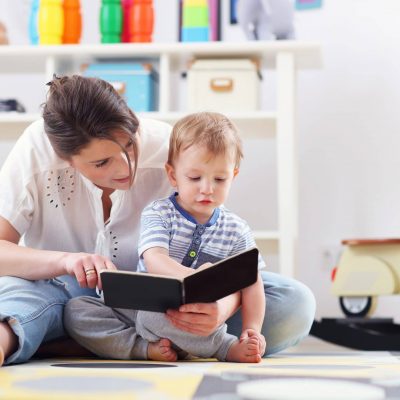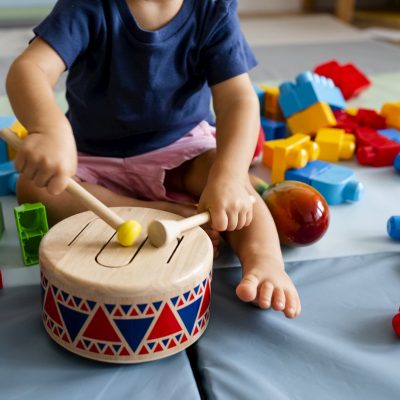Giving your toddler the building blocks of language
Encouraging their communication skills
Language and communication are skills your child will start to develop from the moment they’re born. Hear what speech and language expert, Nicola Lathey7, has to say on the importance of play and imagination, and the effect of the digital age on your child’s language development.
A child’s early years are a time of tremendous growth and opportunity, with early experiences having a lasting effect. Brain development allows a child to learn how to eat, crawl, walk and talk – all of the milestones you watch out for as your baby matures. If you consider how quickly a baby’s brain grows – it triples in size between birth and two years of age1 – it’s easy to see how significant early childhood is in the advancement of young minds.1
Toddlerhood – the critical years
Most people will consider their baby a toddler once they start ‘toddling’ – essentially when they start to walk – although, generally speaking, a toddler is a child between the ages of one to three. Toddler years, and beyond, are a time of great cognitive and social development. Between the ages of two to five, most children will have developed the skills to focus attention for extended periods, and remember specific information.2 It is during this period long-term memory begins to form, which is why most of us cannot remember our childhood prior to the age of two or three.2
As parents, we all long to witness the developmental ‘firsts’ from our child, many of which occur in early toddlerhood – think of the excitement when your child takes their first step or utters their first word – but these skills don’t evolve in isolation. They are part of a much bigger picture involving social interaction, play, observation, and listening.3 Parents can help to encourage children to develop these skills, and gain an interest in the world around them.

“A ‘say what you see’ strategy puts your toddler’s thoughts into words as they experience the world around them”
Early language acquisition is instinctive and, for most children, happens quite naturally.4 But, how we as adults respond to a child’s attempts to communicate can leave an impression.4
A child’s brain develops partly through repeated experiences that structure the way they learn.5 This means a one off comment, or single action, may have little impact on learning, but, in the early years, when something is said or done repeatedly it is likely to stick. With repetition and encouragement you can help your child do more of what they might already be doing by repeating words and reinforcing their actions, making them feel proud about their attempts to communicate.
Speech therapists may suggest that a child needs to hear many times a word in its appropriate context before they will try to say it. Books with repetitive lines can also be a very powerful way of helping a child to talk.
Making traditional playtime educational
It is interesting to note that the development of language in children is closely related to play.4 Indeed, speech therapists have coined the phrase ‘language develops through play’. When children start to utter their first words, usually around one year old, it is also around the same time that symbolic play evolves.4 Symbolic play is the ability to use actions, objects or ideas to represent other actions, objects or ideas; you’ve probably witnessed your child using a banana as a telephone, or putting a bowl on their head as a hat.
“Essentially, symbolic play encourages the use of imagination.”
Research has shown that certain play materials in the home can help promote cognitive development and coordination.6 Toys are fun and can help your child’s imagination flourish from early on. Even the simplest toys can provide situations for learning and development. For example, playing with building blocks, one of the most basic of toys, has been shown to result in significant improvements in language over just a six-month period.1 Building a tower with blocks provides a multitude of speech and language opportunities – adjectives (high, flat), verbs (fall down, build), preposition (on-top), nouns (colours, numbers) are modelled by the adult for the child to understand and copy – as well as communication and social skills to encourage turn taking, sharing, listening and observing.3

There are lots of ways parents can create opportunities that encourage children to practise their language and communication skills. With children experiencing unparalleled physical, mental and emotional growth in their early years, establishing which activities promote development at this time, and which don’t, is incredibly important. Encouraging imaginative play away from the sedentary media exposure provides so much more than a few minutes or hours of ‘fun’. By playing and allowing your child time and space to explore and interact in their own way, you allow your child to develop and learn in a fun and safe environment.3
Written by: Nicola Lathey
Nicola Lathey is one of the top Speech and Language Therapists in the UK. She is the author of the prize-‐winning and best-‐selling book, Small Talk (Macmillan)7, and has spoken about speech and language development in children on national television and national and international radio. She has also featured in newspapers and magazines across the world.
She has given lectures at the request of universities, charities, and businesses in the UK, and last year spoke alongside Professor Sir Robert Winston at The Baby Show in Birmingham’s NEC arena. Nicola is a member of ASLTIP (Association of Speech and Language Therapists in Independent Practice), the Royal College of Speech and Language Therapists, and the Health Professional Council.
- Christakis D et al. Effect of block play on language acquisition and attention in toddlers. Arch Pediatr Adolesc Med 2007; 161(10): 967–971.
- Oswalt A; Early Childhood Cognitive Development: Information Processing. MentalHelp.Net 2008. Available at: https://www.mentalhelp.net/articles/early-childhood-cognitive-development-information-processing/ (Accessed April 2016).
- Icommunicate Speech & Communication Therapy. Available at: http://www.icommunicatetherapy.com/child-speech-language/child-speech-language-development/activities-strategies-help-develop-speech-language-skills (Accessed April 2016).
- Cortese R et al. Child Mind Institute. Helping Toddlers Expand Language Skills – Tips for encouraging kids age 0-5 to talk. Available at: http://childmind.org/article/helping-toddlers-expand-their-language-skills/ (Accessed April 2016).
- Brotherson S et al. NDSU 2009. Understanding Brain Development in Young Children. Available at: https://www.ag.ndsu.edu/pubs/yf/famsci/fs609.pdf (Last accessed April 2016).
- Miquelote A et al. Effect of the home environment on motor and cognitive behavior of infants. Infant Behav Dev 2012; 35: 329-334.
- Lathey N; Small Talk: Simple ways to boost your child’s speech and language development from birth. Macmillan. UK. 2013, 320 pages.
BA20-445
Further Reading
Children’s brains develop as they have new experiences. You cannot see the brain developing, but you can see what new things the child can do.
Children develop at different rates, and that’s completely fine, but here is a rough breakdown of what to expect in your toddler’s early development and a few tips for how you can encourage it.





